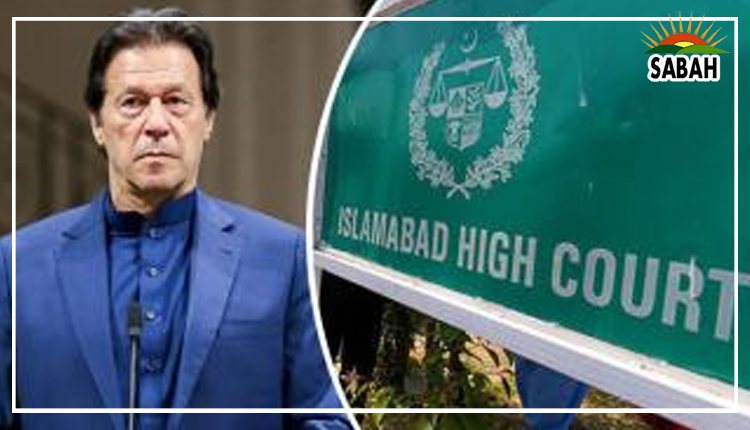IHC Justice Mohsin Akhtar Kayani grants Imran Khan protective bail in remarks against judge case till 7th October
ISLAMABAD, Oct 02 (SABAH): The Islamabad High Court (IHC) granted protective bail to Pakistan Tehreek-e-Insaf (PTI) Chairman and former prime minister Imran Khan till October 7 in a case lodged against him for his controversial remarks against Additional District and Sessions Judge Zeba Chaudhry and police officers during a rally in Islamabad on August 20.
IHC Judge Mohsin Akhtar Kayani granted interim pre-arrest bail to Imran Khan until October 7 against surety bonds of Rs10,000 and directed him to appear before the relevant court.
The petition was filed by Dr. Babar Awan on behalf of the PTI Chairman Imran Khan, a day after a magistrate of Islamabad’s Margalla Police Station issued an arrest warrant for Imran Khan in the contempt case.
During the course of the proceedings, IHC Judge Justice Moshin Akhtar Kayani directed Imran Khan to appear before the concerned court.
Later on the court issued the written order of the bail granted to Imran Khan. It is said in the order that the decision of this court will become ineffective on 7th October. The court order says according to the lawyer, magistrate issued the warrants without issuing any notice. The court order said that according to the counsel Imran Khan is ready to plead his case. The court in its written order said that according to the lawyer of the accused all the sections including in the FIR are bailable. According to the court order, the lawyer says police wanted to arrest Imran Khan in these circumstances. The lawyer said that police has cordoned off the house of Imran Khan and due to this Imran Khan could not appear before the court. The court said that the plea of Imran Khan regarding granting exemption from appearance is also accepted.
In the plea, Imran Khan said that a terrorism case was initially filed against him, however, the charges were later struck down by the high court and the case was transferred.
He alleged that the coalition government had filed a false case against him, the purpose of which was to quash the peaceful movement against the “corruption mafia”.
According to the plea, the purpose of the case was to arrest Imran Khan in order to put an end to a “peaceful political movement.
Speaking to the media outside the court, Babar Awan said the IHC had granted the PTI chief “pre-arrest transitory protective bail”, adding “we will turn up at the lower court before Oct 7.”
Awan said he appeared before Justice Kayani and raised a few “factual points” pertaining to the case.
“I told him that we had already obtained bail in this case as well as the fact these charges can’t be imposed because they are non-cognisable offences,” he said.
The PTI chief’s counsel said whatever happened yesterday evening was “very dangerous” as the whole country stood up without any call. “This imported government must see Imran’s power.”
He was of the view that lawyers, peasants, labourers, students, youth as well as the whole of Pakistan would take to the streets once the party leader gave the date for his long march.
He said it would now be the PTI’s turn to file cases based on “truth and facts”, adding the government won’t be able to lodge cases anymore.
The decision to initiate contempt proceedings against Imran was taken by the IHC’s Justice Aamer Farooq on August 22 while hearing a petition challenging Gill’s police remand. The court had summoned Imran on August 31 and subsequently issued him a show-cause notice.
A day before the hearing, the former prime minister had submitted a reply before the IHC wherein he had expressed his willingness to “take back” his words about Judge Zeba Chaudhry if they were “regarded as inappropriate”. He had pleaded before the IHC that the judges who had agreed to initiate the case against him should consider withdrawing themselves from the bench as, according to him, they had pre-judged the matter.
However, the IHC had deemed the response to be “unsatisfactory” and asked the PTI chief to submit a “well-considered” response.
Following this, Imran Khanhad submitted another reply to the court. In the revised response, Imran had stopped short of rendering an unconditional apology.
On September 8, the IHC had decided to indict Imran, once again calling his response “unsatisfactory”.
However, at the next hearing on September 22, when it was expected that charges would be framed against the PTI chief, Imran had offered to tender an apology to Judge Chaudhry and escaped the indictment.
Following his statement in the court, the larger bench hearing the case had said that it was “satisfied” with the apology and asked the PTI chief to submit an affidavit.
Prior to submitting the affidavit, Imran Khan on Friday appeared before an Islamabad sessions court to personally apologise to Judge Chaudhry, but his apology was left hanging as the judge was on leave.
Meanwhile, in his affidavit, Imran said he had “realised during these (contempt) proceedings before the honourable court that he might have crossed a red line”. However, he added, he never intended to threaten Judge Chaudhry and “there was no intention behind the statement to take any action other than legal action”.
He said he wanted to assure the IHC that he was willing to explain and clarify before Judge Chaudhry that “neither he nor his party seeks/sought any action“ against her and he was willing to apologise to her “if she got an impression that the deponent (Imran) had crossed a line”.
He also expressed his willingness to take any further steps that the IHC “deems necessary and appropriate for the satisfaction of the honourable court that he never intended to interfere in the process of the court or impugn the dignity or independence of the judiciary”.
The FIR registered against Khan includes four sections of the Pakistan Penal Code (PPC), including 506 (punishment for criminal intimidation), 504 (intentional insult with intent to provoke breach of the peace), 189 (threat of injury to public servant), and 188 (disobedience to order duly promulgated by public servant).












